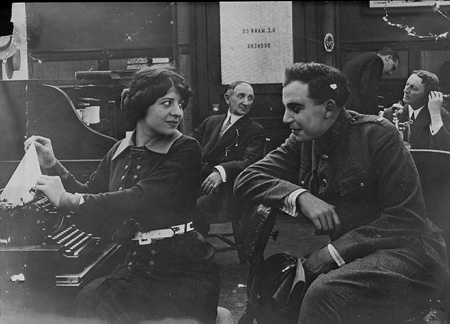 Volume II: Filmography
Volume II: Filmography Volume II: Filmography
Volume II: Filmography

Production still with Marguerite Snow and James Cruze, with Riley Chamberlin in the background and Arthur Bauer on the phone. Courtesy of Dominick Bruzzese. (F-571)
July 25, 1913 (Friday)
Length: 1 reel (1,000 feet)
Character: Drama
Cast: James Cruze (the sergeant), Marguerite Snow (his sweetheart), Riley Chamberlin (an office clerk), Arthur Bauer (office clerk)
Location: Views of military exercises on Governor's Island in New York Harbor; views of Lower Manhattan. (Also see note)
Note: Some leftover Thanhouser footage of the military exercises on Governor's Island was used as a filler, Army Maneuvers at Governor's Island, which was appended to the one-reel Majestic film, Impulse, released on July 13, 1913.
ADVERTISEMENT, The New York Dramatic Mirror, July 16, 1913:
"A girl is in love with an army officer who, in his spare time, instructs her in the signal code. One of the young woman's diversions is to go on the roof of the New York office building, where she is employed, and from that great height observe the wonderful city below. One day, she enters onto the roof, and the spring lock of the roof door snaps and a storm comes up. Then she thinks of the code her sweetheart taught her."
SYNOPSIS, The Moving Picture World, July 26, 1913:
"A dapper sergeant in the army won the love of a pretty young stenographer, and they had planned that soon as his term of enlistment was up he would enter private life and marry her. The girl was employed by a firm that had offices in one of the tallest of New York skyscrapers, and her sweetheart saw her there. She took him to her favorite observatory, the roof of the building, where he obtained a magnificent and uninterrupted view of the greatest city in the world. He, on his part, took his sweetheart to the army maneuvers, where she witnessed with delight the well-drilled troops, but would not confess there was one man among them who could not compare with the one of her choice. She was particularly interested in the signal corps, however, and at odd times the sergeant instructed her in the code until she had become fairly proficient in it.
"One Saturday afternoon the girl repaired to her 'observatory' and gazed longingly towards Governor's Island, for it was there that her fiancé was stationed. In some way the door to the roof became closed behind her, and as it was a spring lock, she found herself a prisoner. Beating on the door failed to bring her any help. The crowds in the street, many, many feet below, could not see or hear her, and she finally realized with growing terror that relief would probably not come before Monday morning. Exposed to the elements all that night, she was on the verge of a breakdown the following morning, and knew that she could never stand another 24 hours of privation. Suddenly, she thought of the signal code which she had laughingly learned from her soldier sweetheart. With her veil and a piece of wood she found on rooftop, she improvised a crude flag, and facing Governor's Island, repeated over and over again the one word, 'Help.' Fortunately for her, the sergeant had a visitor that day, a sea captain, and he pointed out to him the magnificent building where the girl of his heart was employed. The captain took a closer glance through his field glasses, caught the signal, and the man she loved was able to save the girl who, when he found her, was unconscious and rapidly nearing death."
REVIEW, The Morning Telegraph, July 27, 1913:
"A very interesting method of showing the top of the great metropolis, with its multitudes of roofs and skyscrapers, has been utilized in this film. A story which takes place principally on the tops of the skyscrapers is interwoven with the illustrative views, in which Margaret Snow and James Cruze play the leads."
REVIEW, The Moving Picture World, August 2, 1913:
"A love story with a distinctly novel setting. The girl works in a lower New York skyscraper and her lover is a lieutenant on Governor's Island. She learns the army signal service and when she is locked out on the roof Saturday night only her frantic appeals to her distant lover save her. Close views of New York skyscrapers and Governor's Island are shown. A novel offering."
REVIEW, The New York Dramatic Mirror, July 30, 1913:
"A girl who has a habit of frequently viewing the lower end of New York City from the top of the skyscraper where she is employed is accidentally locked out on the roof one Saturday night, and is unable to make anyone hear her frantic appeals for help. But it happens that her military fiancé, stationed within sight at Governor's Island, has taught her the wigwag code, so she fastens her jacket to a stick and signals in his direction. It happens that he has just - it is now Sunday morning - been pointing out where she works to a friend through a field glass, so she is discovered. Of course, she is rescued very promptly and all is well. This is all very obvious from beginning to end, told in this story in narrative fashion, with little (if any) incidental action to sustain interest. It is strictly polite drama, however, and will prove acceptable on that score, and by virtue of good acting and photography to high-class audiences."
# # #
Copyright © 1995 Q. David Bowers. All Rights Reserved.